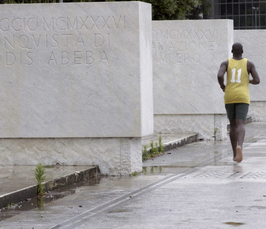A Difficult Heritage: The Afterlife of Fascist-Era Architecture, Monuments, and Works of Art in Italy
Internationale Studientagung
- Beginn: 11.03.2019 10:00
- Ende: 12.03.2019 20:00
- Ort: American Academy in Rome, Via Angelo Masina 5, 00153 Rom und Villino Stroganoff, Via Gregoriana 22, 00187 Rom

The conference focuses on the material history of Fascist-era works of art, monuments and architecture in Italy, and examines their afterlife and reception in the longue durée. In order to frame the contemporary debate, a transdisciplinary approach and a historical perspective will take as its starting point the iconoclasm following the Fall of the Regime (July 25th, 1943). Papers will explore the ambiguous transition from Fascism to the Republic and the dynamics of postwar censorship. Moreover, the critical examination of artistic historiography, together with the main narratives of the history of Italian art, aims to underline elements of continuity throughout the 20th century. It also permits a re-examination of the damnatio memoriae implicating some of the artists close to the Regime and the role played by private collections in the preservation and survival of Fascist-era works of art.
Probing the theoretical concept of 'difficult heritage' in relation to the peculiarities of the Italian case, and in a comparative perspective with other nations, the conference addresses issues of restoration, display, and critical preservation of Fascist-era artefacts located in public and institutional spaces. The event aims to foster a discussion open to different disciplines such as History, History of Architecture, Heritage Studies, Literature, Philosophy, and Anthropology, and to examine the potential contribution of Art History to the topic. Strategies of memorialization and the role of contemporary art interventions will be discussed in an open dialogue with artists focusing on political monuments and multilayered memories in public space.
Presentations will be held in English and Italian. The conference and the discussion are open to the public. No registration required.
The project is made possible in part by the Fellows' Project Fund of the American Academy in Rome.
Concept and Scientific Organization: Carmen Belmonte, 2019 Italian Fellow American Academy in Rome
PROGRAM
Monday, 11 March Bibliotheca Hertziana — Max-Planck-Institut für Kunstgeschichte
10:00 Welcome
Tristan Weddigen, Bibliotheca Hertziana, Rome
10:10 Introduction
Carmen Belmonte, American Academy in Rome
Fascist-Era Artefacts in Italy: From Iconoclasm to Critical Preservation
10:30-11:45 Works of Art and Historiography
Chair Peter Benson Miller, American Academy in Rome
Giuliana Pieri, Royal Holloway, University of London
Fascism and the Arts: A Difficult Legacy
Michele Dantini, Università per Stranieri di Perugia/IMT Scuola di Alti Studi, Lucca
Religioni politiche. Amnesia e rimozione nella storia dell'arte italiana postbellica
11:45 Break
12:00-13:15 The Multiple Lives of Buildings
Chair Lynne Lancaster, Ohio University/American Academy in Rome
Rosalia Vittorini, Università degli Studi di Roma 'Torvergata'
Architettura e fascismo: vita e destino delle opere per il regime
Hannah Malone, Freie Universität Berlin
Questioning the Idea of Italy's Fascist Architecture as Difficult Heritage
13:15 Lunch
14:15-15:45 Monumentality
Chair Maria Bremer, Bibliotheca Hertziana, Rome
Andrea Pinotti, Università degli Studi di Milano
The Negation of the Monument. Contemporary Strategies of Memorialization
Nina Fischer & Maroan El Sani, Berlin
Projection of Freedom of Movement, short film, 2018
16:30-17:30 On-site visit to L'Italia tra le Arti e le Scienze by Mario Sironi (speakers only)
with Eliana Billi, Sapienza, Università degli Studi di Roma
***
Tuesday, 12 March American Academy in Rome
10:00 Welcome
John Ochsendorf, American Academy in Rome
10:15-11:30 From Fascism to the Republic
Chair Carmen Belmonte, American Academy in Rome
Ester Coen, Roma
Corrado Cagli 1935 Race of the Barber Horses: Restoring and Interpreting
Joshua Arthurs, West Virginia University
Revolutionary Iconoclasm and Damnatio Memoriae after the Fall of Mussolini
11:45 Break
12.45-12:45 am
Franco Baldasso, Bard College, New York
Fear of Freedom. Carlo Levi and Alberto Savinio on the Legacy of Fascism in Early Postwar Italy
13:00 Lunch
14:00-15:15 Politics of Memory
Chair Jim Carter, University of Michigan/American Academy in Rome
Flaminia Bartolini, Cambridge Heritage Research Centre, University of Cambridge
From Iconoclasm to Heritage: Mussolini's Legacy, Display and Politics in Contemporary Italy
Liza Candidi T.C., Humboldt-Universität Berlin/Università degli Studi di Milano-Bicocca
Architettura e arte monumentale pubblica. Politiche di memoria, le due Germanie e il post-89
15:15 Break
15:30-16:45 Political Monuments and Contemporary Art
Chair Lindsay Harris, Independent Scholar, Rome
Alessandro Gallicchio, TELEMMe, Aix-Marseille Université
Relations Between Italian Architectural Modernism and Contemporary Art in Tirana (Albania) through the Prism of the 'Unwanted Heritage'
Karyn Olivier, Tyler School of Art, Temple University/American Academy in Rome
Witness
16:45 Discussion
18:00 Conversations/Conversazioni
Are monuments history?
Dell Upton (2019 AAR Resident) is chair of the Department of Art History at the University of California, Los Angeles, and professor emeritus of architecture at University of California, Berkeley
Adachiara Zevi is an architect, art historian, and president of Fondazione Bruno Zevi